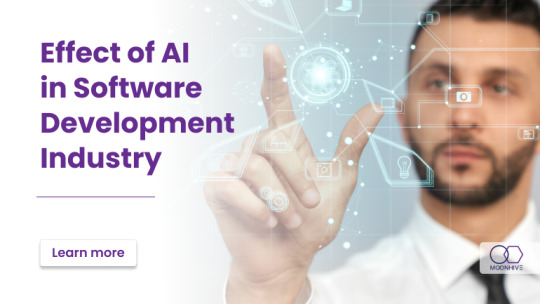#CodingAutomation
Explore tagged Tumblr posts
Text

What are the main tasks you use Gemini AI for?
A. Answering questions B. Generating text C. Translating languages D. Coding
#GeminiAI#GeminiAIQuiz#followme#followforfollow#instadaily#follow4follow#like4like#letsconnect#amigowayspoll#amigoways#TaskAutomation#AIInnovation#TextGeneration#LanguageTranslation#CodingAutomation#TechInBusiness#DigitalTransformation#AIApplications#FutureOfWork
0 notes
Text

How Artificial Intelligence Can Impact Software Development?
Learn More: https://rb.gy/syqvj
#aiinsoftwaredevelopment#CodingAutomation#AIProductivity#aiandcoding#softwaredevelopment#AI#AIProgramming#DevOpsAI#CodeOptimization#AiAssistants
0 notes
Text
The Future of AI in Software Architecture
Artificial Intelligence (AI) is transforming various industries, and software architecture is no exception. AI-driven innovations are changing the way applications are designed, built, and maintained. AI can optimize processes, enhance security, and improve performance. In this blog, we will explore how AI is shaping the future of software architecture.
The Role of AI in Software Architecture
1. Automated Code Generation
AI can generate code efficiently, reducing development time.
AI-powered tools must assist developers by detecting errors before deployment.
GitHub Copilot and OpenAI Codex are being used to suggest code snippets, making the development process faster.

2. Intelligent Debugging and Testing
AI helps identify bugs more accurately than traditional methods.
AI-driven testing tools should reduce human effort and enhance software reliability.
Example: Tools like Test.ai and Functionize use AI to automate testing processes.
3. Predictive Maintenance
AI can analyze historical data to predict system failures.
AI-based monitoring must notify engineers about potential issues before they escalate.
Daily Life Example: Just like a car’s smart dashboard alerts drivers about low fuel, AI warns developers about system vulnerabilities.
How AI Compares with Traditional Software Development
FeatureTraditional Software DevelopmentAI-Driven Software DevelopmentCode GenerationManual codingAutomated AI-generated codeDebuggingManual testing & debuggingAI-powered debuggingPerformance OptimizationHuman-driven tuningAI-driven self-optimizationSecurity MonitoringReactive approachProactive AI-based security
AI Impact on Software Architecture
1. Enhanced Scalability
AI-driven architectures can scale applications dynamically.
Cloud platforms have started using AI for load balancing and resource allocation.
2. Security Enhancements
AI-powered security systems must detect cyber threats before they cause damage.
AI helps track suspicious activity and prevent data breaches.
Fact: According to a report by IBM, AI-based cybersecurity reduces security breaches by 40%.
3. Evolution of Microservices Architecture
AI plays a vital role in microservices by automating service orchestration.
AI-based tools can analyze traffic patterns and adjust services accordingly.
Challenges of AI in Software Architecture
1. Ethical Concerns
AI may introduce bias in decision-making.
Developers must ensure ethical AI practices to avoid unfair algorithms.
2. Data Privacy Issues
AI-driven systems need to handle vast amounts of user data securely.
Compliance with data regulations should be a top priority.
3. Dependence on AI Tools
Over-reliance on AI can lead to reduced human expertise.
Developers should maintain a balance between AI automation and manual oversight.
Future Predictions: What’s Next?
AI will continue to evolve and transform software development.
AI might replace traditional software engineering roles, but human oversight must remain essential.
Fact: By 2030, AI in software development is expected to grow into a $50 billion industry.
AI-driven self-coding platforms are likely to dominate the market.
Conclusion
The future of AI in software architecture looks promising. AI is not replacing developers but enhancing their capabilities. Companies should embrace AI to stay competitive. As AI advances, the software development landscape will keep evolving. With AI taking over routine tasks, developers must focus on creativity, strategy, and innovation. After all, AI is a tool, not a replacement.
0 notes